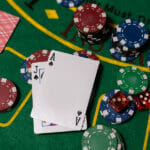In the ever-expanding universe of entertainment and leisure, two activities stand out for their enduring popularity and cultural impact: gaming and gambling. Both have undergone remarkable transformations over the years, but their evolutionary paths have been distinct, shaped by a myriad of factors such as technological innovation, shifts in societal attitudes, and changes in consumer behaviour. เว็บสล็อต While gaming has transitioned from rudimentary board games to immersive virtual worlds, gambling has moved from simple dice games to complex online betting platforms. Despite these individual trajectories, there are intriguing points where these two worlds intersect, as well as areas where they diverge significantly. This article aims to offer an in-depth exploration into the rich histories, technological milestones, and societal ramifications of both gaming and gambling. We will scrutinise the elements that bring them together, as well as those that set them apart, to provide a comprehensive understanding of these two fascinating domains of human activity.
Historical Development
The historical development of gaming and gambling is a fascinating journey that takes us back to the earliest chapters of human civilization. Each has its own rich tapestry of history, marked by innovations, societal shifts, and cultural influences that have shaped their current forms.
Starting with gaming, slot pg [valid where legal] its most rudimentary forms can be traced back to ancient civilizations. In Egypt, for example, one of the earliest known board games is Senet, a game that involved a grid and specialised pieces, and was often associated with religious and spiritual themes. Similarly, in ancient China, the strategy game Go captivated minds with its complex gameplay that involved capturing territory on a gridded board. These games were not merely pastimes; they often held cultural and even spiritual significance, serving as microcosms of the societies from which they originated.
As time progressed, the world of gaming expanded to include more intricate forms. Card games began to gain popularity, especially in mediaeval Europe, where they were often associated with the aristocracy and used both for entertainment and education. The invention of the printing press further facilitated the spread of card games by making it easier to produce decks.
The latter half of the 20th century marked a seismic shift in gaming with the advent of video games. Initially confined to arcades, video games soon found their way into homes with the development of gaming consoles. The digital age propelled gaming into new dimensions, introducing genres and gameplay mechanics that were previously unimaginable. From simple pixelated games like ‘Pong’ to the graphically rich and complex multiplayer online games of today, the evolution of gaming has been nothing short of revolutionary.
Turning our attention to gambling, its origins are equally ancient, albeit rooted in different cultural practices. The act of casting lots, a rudimentary form of randomization, has been mentioned in biblical texts, indicating that the concept of leaving certain decisions to chance is an age-old human practice. Over the centuries, this evolved into more structured forms of betting and wagering. Games of chance like roulette became popular in European gambling houses, while skill-based betting activities like poker found a following in various parts of the world. The essence of gambling has always revolved around the wagering of money or valuables on outcomes that are partially or entirely subject to chance.
The concept of gambling has been so deeply ingrained in human culture that it has been integrated into various aspects of life, from religious ceremonies to social gatherings. The development of mathematical theory in the Renaissance period even led to the formalisation of probability theory, which has since become a cornerstone of gambling strategies.
While gaming and gambling have distinct historical roots, both have evolved significantly over time, influenced by technological advancements and shifts in societal norms. Gaming transitioned from simple board games to complex video games, while gambling moved from casting lots to sophisticated betting systems. Each has its own unique history, but both are testaments to human ingenuity and the enduring appeal of games and chance in our lives.
Image Source: BigStockPhoto.com (Licensed)
Site Disclaimer
IncredibleThings.com is not a gambling operator or sports betting operator or a gambling site of any kind, and none of its affiliates or subsidiaries constitute gambling operators or sports betting operators. IncredibleThings.com does not offer or provide real currency gambling services of any kind.
IncredibleThings.com will hold no liability for the consequences of actions that occur at offshore casinos that accept players from the locations where online gambling is prohibited and/or restricted or if a visitor is below the legal gambling age. The content of this site is for entertainment and informational purposes only, and as such, we do not condone financial dealings with any of these sites. It is the sole responsibility of the person playing to ensure that their online casino play falls within the realm of local, state, and federal law. If you use a link that exists on our site to navigate to a third party casino, this is something that is done of your own free will and also at your own risk. You acknowledge and agree that IncredibleThings.com shall not be liable to you or any third party for any losses, damages, claims, suits, costs or expenses of any kind.
Related Categories: Casino, Games, Reviews








